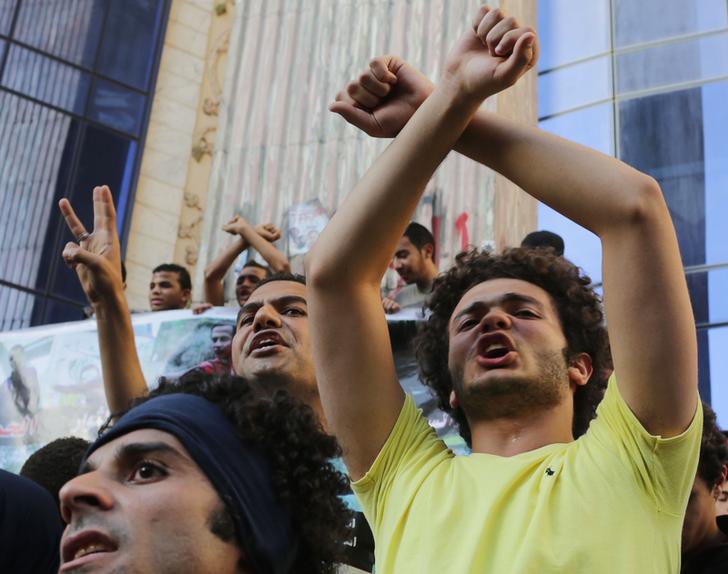Latest NEWS
- Aswat Masriya, the last word
- Roundup of Egypt's press headlines on March 15, 2017
- Roundup of Egypt's press headlines on March 14, 2017
- Former Egyptian President Hosni Mubarak to be released: lawyer
- Roundup of Egypt's press headlines on March 13, 2017
- Egypt's capital set to grow by half a million in 2017
- Egypt's wheat reserves to double with start of harvest -supply min
- Roundup of Egypt's press headlines on March 12, 2017
Activists in Egypt say online monitoring is scare tactic

Protesters from the 6th of April group and other opposition activists chant slogans after taking part in what they dub a "Freedom marathon, calling for the release of activists in detention, in front of the press syndicate in Cairo April 12, 2014. REUTERS/Asmaa Waguih
By Ola Noureldin and Yasmine El Demerdash
CAIRO, June 2 (Aswat Masriya) A group of activists has created a trending hashtag on Twitter that translates to "we are being watched" in response to Egypt's launching of a security system to monitor online activities.
The new system will track down certain words such as “bombs”, “explosives,” or “terrorism” to maintain the country’s national security, a security source told Aswat Masriya.
The source explained that the system aims to protect the people's security and is a mechanism to achieve stability. He added that terrorists who carry out harmful acts and target state enterprises will be tracked and punished.
Ramy Raoof, a blogger and social media expert, told Aswat Masriya that this kind of censorship has been in effect from even before 2011.
“It is proven that major spying and control of information are practiced by the ministry of interior. Maybe it is not widely declared, but it is proven,” Raoof said.
He added that the monitoring of information is not a strange phenomenon to Egypt but that the government is now trying to implement it on a wider scale.
“They are now targeting bloggers, columnists and even field journalists under the umbrella of 'national security.' This of course is a breach of privacy that hinders freedom of expression and the right to knowledge, but again it has been going on for so long and no one seems to find the way to stop it,” he said.
Award-winning journalist and blogger Wael Abbas said that police officers, students and workers have been detained or dismissed because of content they published online in what he described as a “breach of privacy backed by unconstitutional laws".
“Social media monitoring has been there since Mubarak, but to go public with it at this time is a scare tactic intended to threaten social media activists and journalists,” Abbas said.
Information Systems Security Association (ISSA) spokesman and cybersecurity expert, Mohamed El-Gindy, explained that monitoring online activity might be important for analysis and observing public opinion, but is not feasible for content blocking.
“It is much easier and cheaper for users to overcome barriers implemented by the government, through proxies for example, than it is to install expensive monitoring technology,” said El-Gindy.
El-Gindy also warned that such a move might backfire internally, and invoke worldwide condemnation against human rights violation and breaches of freedom of expression.










